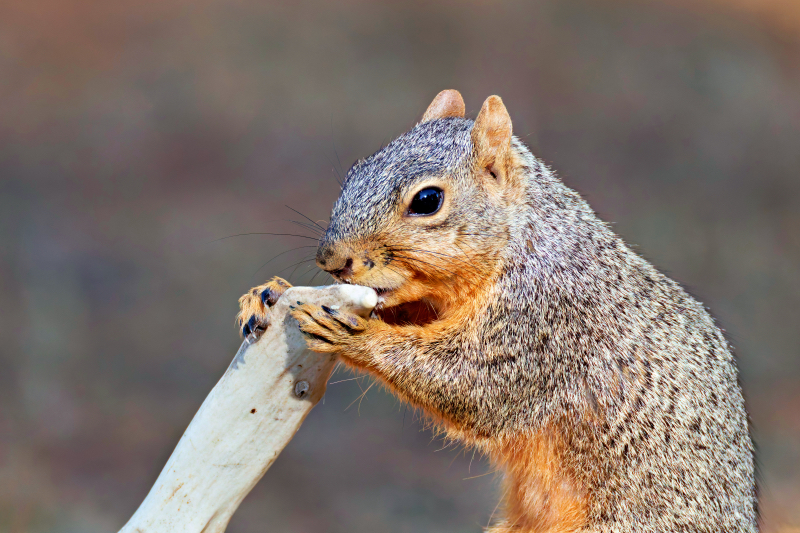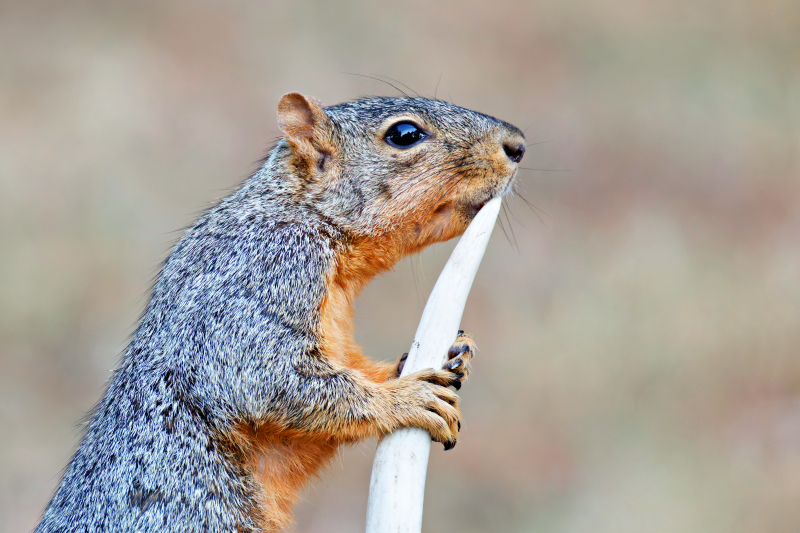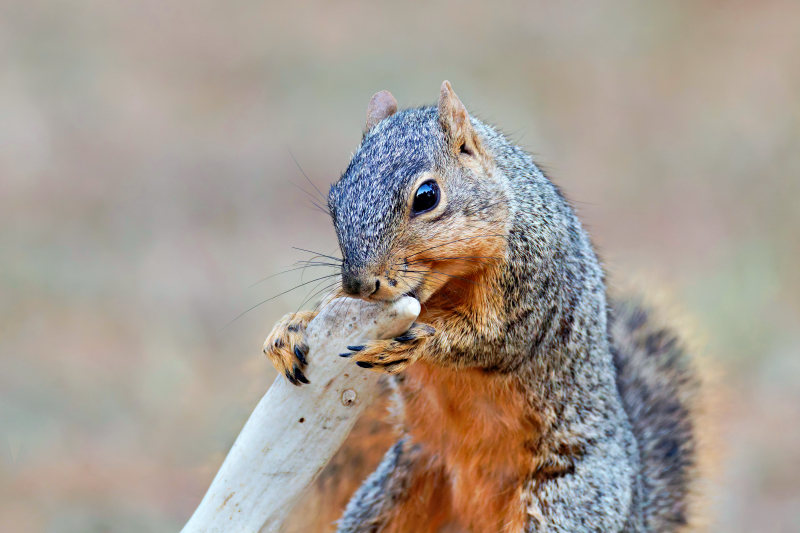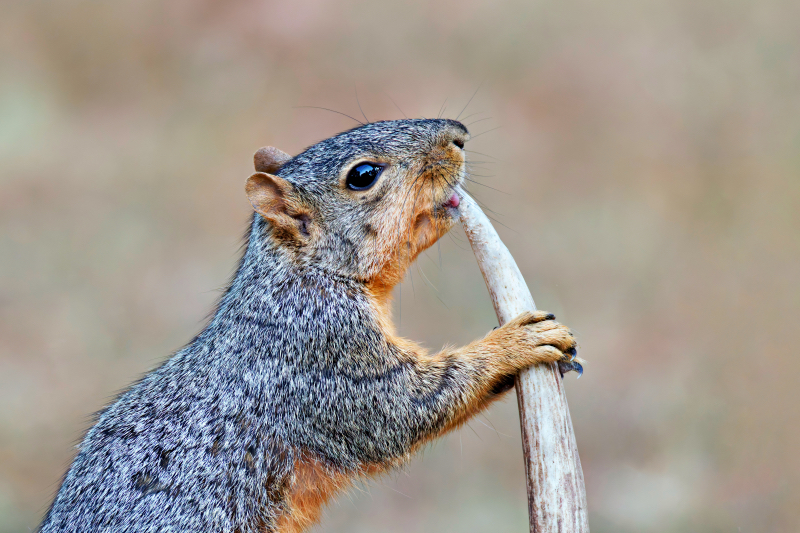Today, I’m sharing a series of photos I took of a Fox Squirrel chewing on a White-tailed Deer antler in my flower garden. I’ve mentioned before that I keep these antlers in my yard mainly for the squirrels, and they never disappoint. Watching them gnaw away is not just entertaining; it’s also a fascinating glimpse into their natural behaviors.
Why Do Squirrels Chew on Antlers?
Fox Squirrels, like many other rodents, have a variety of reasons for chewing on antlers. This behavior is known as osteophagy, and it’s more than just idle gnawing. Let’s look at why these animals are drawn to deer antlers and how it benefits them.
Nutritional Benefits: A Source of Essential Minerals
Antlers are a valuable source of nutrients for squirrels, particularly in the form of minerals. These bony structures are composed of roughly 19% calcium and 10% phosphorus, both crucial for maintaining the health of a squirrel’s bones and teeth. The need for these minerals increases during certain times, making antlers an important dietary supplement.
- Calcium and Phosphorus: These minerals are essential for skeletal health, and squirrels are known to seek out calcium-rich sources, especially during late winter and spring when other natural sources may be scarce. This need becomes even more significant for female squirrels during late-stage pregnancy and nursing when the demand for calcium increases.
- Other Trace Minerals: In addition to calcium and phosphorus, antlers contain various other minerals like magnesium, sodium, potassium, zinc, and even trace amounts of iron and manganese. These can help fill any dietary gaps the squirrel may experience, especially in periods when their usual food sources are limited.
In a study conducted by J.R. Callahan at the University of New Mexico, researchers found that lactating female squirrels were particularly inclined to gnaw on bones, including antlers, more often than non-lactating squirrels. This indicates a clear link between osteophagy and the nutritional demands associated with reproduction.
Dental Maintenance: Keeping Those Teeth in Shape
One of the most critical aspects of squirrel behavior is the need to constantly gnaw to keep their teeth properly maintained. Rodents like squirrels have four continuously growing incisors, two on top and two on the bottom, that must be kept in check through regular chewing.
- Ever-growing Incisors: These teeth, called elodonts, grow throughout the squirrel’s life. Without something hard to gnaw on, they can become too long, potentially leading to health problems and difficulty in feeding.
- Tooth Wear and Sharpening: The enamel on a squirrel’s teeth is extremely hard, allowing them to chew through tough materials like antlers. This helps not only to file down the teeth but also to keep them sharp enough to crack open nuts and other tough food items.
The hard, durable nature of antlers makes them ideal for wearing down a squirrel’s teeth, ensuring they remain functional and do not grow excessively.
Ecological Role: Helping to Recycle Nature’s Debris
The habit of gnawing on shed antlers extends beyond individual benefits for the squirrel. It also plays a role in the ecosystem by aiding in the decomposition and recycling of naturally occurring materials.
- Natural Disposal: When a squirrel gnaws on an antler, it helps break down the material over time, preventing an accumulation of bones and shed antlers in the environment. This contributes to a more balanced ecosystem where nutrients can be cycled back into the soil.
- Supporting Other Wildlife: By fragmenting these materials, squirrels indirectly make nutrients more accessible to other organisms, including insects and microorganisms that play a role in the decomposition process.
The Fascinating Behavior of Osteophagy
Osteophagy may seem unusual, but it’s a common behavior among various wildlife species. Deer, rodents, and even birds are known to chew on bones or antlers when the opportunity arises. The practice serves multiple purposes, from addressing dietary needs to supporting dental health.
For squirrels, chewing on antlers is a practical adaptation to their natural surroundings. It highlights how wildlife can utilize available resources to meet their nutritional and physiological needs, especially when food sources fluctuate with the seasons.

A Closer Look at Fox Squirrels in My Yard
Over the years, I’ve observed the Fox Squirrels in my yard engaging in osteophagy quite often. I place the antlers in accessible spots within the garden to encourage this natural behavior, and it’s always a delight to see them gnawing away.
Whether it’s a female squirrel preparing for the challenges of nursing or a young squirrel sharpening its teeth, the antlers provide a versatile resource for these adaptable animals. Watching them engage in such a beneficial and instinctual activity is a reminder of the complex interactions between wildlife and their environments.
Fox Squirrels are more than just charming backyard visitors. Their behaviors, including chewing on antlers, tell a story of survival, adaptation, and ecological contribution. The next time you come across a shed antler in the woods, remember that it’s more than just a piece of bone, it’s a valuable resource for many creatures, including these industrious squirrels.
Feel free to share your own experiences or observations of wildlife using unusual materials in their natural behaviors. There’s always something new to learn from nature!




Was just reading your piece about cicadas, now reading through the rest of your writing 😊
Awesome blog 🤩
Thanks and thanks for taking the time to read my blog.